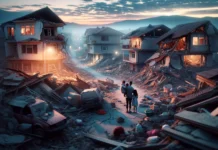The tragedy of the migrant crisis in Tunisia
The recent discovery of 11 migrant bodies near the Tunisian border has shocked the world and highlighted the ongoing humanitarian crisis in the region. According to the International Organization for Migration (IOM), more than 1,000 people have died or gone missing while trying to cross the Mediterranean Sea this year alone.
The migrants, mostly from sub-Saharan Africa, are fleeing poverty, violence and persecution in their home countries. They hope to reach Europe, where they believe they can find a better life and opportunities. However, their journey is fraught with dangers and obstacles. They face exploitation, abuse and violence from smugglers, traffickers and militias. They also risk drowning, dehydration and exposure to harsh weather conditions.
The Tunisian authorities have been struggling to cope with the influx of migrants, especially since the outbreak of the coronavirus pandemic. Tunisia has been praised for its democratic transition after the 2011 revolution, but it also faces economic and social challenges that have been worsened by the health crisis. The country has limited resources and capacity to provide adequate assistance and protection to the migrants, who often end up in overcrowded and unsanitary camps or detention centers.
The international community has a moral and legal obligation to help Tunisia and other countries in the region to address the migrant crisis. The European Union, in particular, should increase its support and solidarity with its southern neighbors, and not outsource its responsibility to them. The EU should also ensure that its migration policies respect human rights and international law, and do not push migrants back to unsafe countries or situations.
The migrant crisis in Tunisia is not only a humanitarian issue, but also a political and security one. It affects the stability and development of the region, as well as the relations between Europe and Africa. It requires a comprehensive and coordinated response that tackles the root causes of migration, such as poverty, conflict and climate change, as well as the immediate needs of the migrants, such as rescue, reception and integration. Only then can we prevent more tragedies like the one that claimed the lives of 11 innocent people near the Tunisian border.










